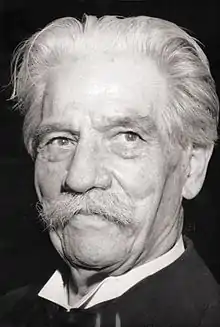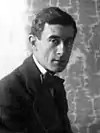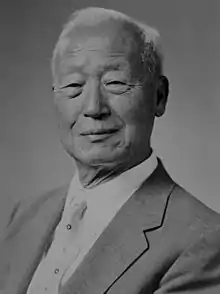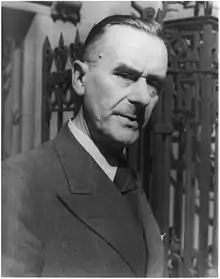1875
1875 (MDCCCLXXV) was a common year starting on Friday of the Gregorian calendar and a common year starting on Wednesday of the Julian calendar, the 1875th year of the Common Era (CE) and Anno Domini (AD) designations, the 875th year of the 2nd millennium, the 75th year of the 19th century, and the 6th year of the 1870s decade. As of the start of 1875, the Gregorian calendar was 12 days ahead of the Julian calendar, which remained in localized use until 1923.
| Millennium: | 2nd millennium |
|---|---|
| Centuries: | |
| Decades: | |
| Years: |
| 1875 in topic |
|---|
| Humanities |
|
Archaeology – Architecture – Art Film - Literature – Music - (jazz) |
| By country |
| Australia – Belgium – Brazil – Bulgaria – Canada – Denmark – France – Germany – Mexico – New Zealand – Norway – Philippines – Portugal – Russia – South Africa – Spain – Sweden – United Kingdom – United States – Venezuela |
| Other topics |
| Rail transport – Science – Sports |
| Lists of leaders |
| Sovereign states – State leaders – Territorial governors – Religious leaders |
| Birth and death categories |
| Births – Deaths |
| Establishments and disestablishments categories |
| Establishments – Disestablishments |
| Works category |
| Works |
| Gregorian calendar | 1875 MDCCCLXXV |
| Ab urbe condita | 2628 |
| Armenian calendar | 1324 ԹՎ ՌՅԻԴ |
| Assyrian calendar | 6625 |
| Baháʼí calendar | 31–32 |
| Balinese saka calendar | 1796–1797 |
| Bengali calendar | 1282 |
| Berber calendar | 2825 |
| British Regnal year | 38 Vict. 1 – 39 Vict. 1 |
| Buddhist calendar | 2419 |
| Burmese calendar | 1237 |
| Byzantine calendar | 7383–7384 |
| Chinese calendar | 甲戌年 (Wood Dog) 4571 or 4511 — to — 乙亥年 (Wood Pig) 4572 or 4512 |
| Coptic calendar | 1591–1592 |
| Discordian calendar | 3041 |
| Ethiopian calendar | 1867–1868 |
| Hebrew calendar | 5635–5636 |
| Hindu calendars | |
| - Vikram Samvat | 1931–1932 |
| - Shaka Samvat | 1796–1797 |
| - Kali Yuga | 4975–4976 |
| Holocene calendar | 11875 |
| Igbo calendar | 875–876 |
| Iranian calendar | 1253–1254 |
| Islamic calendar | 1291–1292 |
| Japanese calendar | Meiji 8 (明治8年) |
| Javanese calendar | 1803–1804 |
| Julian calendar | Gregorian minus 12 days |
| Korean calendar | 4208 |
| Minguo calendar | 37 before ROC 民前37年 |
| Nanakshahi calendar | 407 |
| Thai solar calendar | 2417–2418 |
| Tibetan calendar | 阳木狗年 (male Wood-Dog) 2001 or 1620 or 848 — to — 阴木猪年 (female Wood-Pig) 2002 or 1621 or 849 |
Wikimedia Commons has media related to 1875.
Events
January–March
- January 1 – The Midland Railway of England abolishes the Second Class passenger category, leaving First Class and Third Class. Other British railway companies follow Midland's lead during the rest of the year (Third Class is renamed Second Class in 1956).
- January 5 - The Palais Garnier, one of the most famous opera houses in the world, is inaugurated in Paris.
- January 12 – Guangxu becomes the 11th Qing Dynasty Emperor of China at the age of 3, in succession to his cousin.
- January 14 – The newly proclaimed King Alfonso XII of Spain (Queen Isabella II's son) arrives in Spain to restore the monarchy during the Third Carlist War.
- February 3 – Third Carlist War – Battle of Lácar: Carlist commander Torcuato Mendíri secures a brilliant victory, when he surprises and routs a Government force under General Enrique Bargés at Lácar, east of Estella, nearly capturing newly crowned King Alfonso XII. The Carlists take several pieces of artillery, more than 2,000 rifles, and 300 prisoners. 800 men of both sides are killed (mostly government troops).
- February 18 – The Mason County War begins, as a German-American mob breaks into a prison, and lynches cattle rustlers in central Texas.
- February 24 – The SS Gothenburg sinks off Australia's east coast with the loss of approximately 102 lives, including a number of high-profile civil servants and dignitaries.
- February 25 – The majority of the Yavapai (Wipukyipai) and Tonto Apache (Dil Zhéé) tribes are forced by the United States Cavalry, under command of Brigadier General George Crook, to walk at gunpoint from Arizona's Verde Valley, to the San Carlos Apache Indian Reservation, 180 miles to the southeast. The two tribes are not allowed to return to the Verde Valley until 1900.
- February 27 – Newton Booth, 11th Governor of California, resigns, having been elected Senator. Lieutenant Governor of California Romualdo Pacheco becomes acting Governor. He is later replaced by elected governor William Irwin.
- March 1 – The United States Congress passes the Civil Rights Act, which prohibits racial discrimination in public accommodations and jury duty.
- March 3
- March 15 – Roman Catholic Archbishop of New York John McCloskey is named the first cardinal in the United States.
April–June
- April – 'Albert's swarm' of Rocky Mountain locusts begins to devastate the western United States.[1]
- April 10 – The Arya Samaj is founded in Mumbai by Swami Dayananda Saraswati.
- April 25 – Ten sophomores from Rutgers College (modern-day Rutgers University) steal a one-ton cannon from the campus of the College of New Jersey (modern-day Princeton University), and start the Rutgers–Princeton Cannon War.
- May 7 – The Treaty of Saint Petersburg is signed between Japan and Russia.
- May 7 – German liner SS Schiller wrecks on the rocks off the Isles of Scilly, with the loss of 335 lives.
- May 17 – Aristides wins the first Kentucky Derby.
- May 20 – The Metre Convention is signed in Paris, France.
- June – The record-setting American clipper Flying Cloud of 1851 is burned for scrap metal.
- June 4 – Two American colleges play each other in arguably the first game of college football:[2] Tufts University and Harvard University at Jarvis Field in Cambridge, Massachusetts.
- June 18 – The Dublin whiskey fire leaves 13 people dead and causes more than €6 million worth of damage.
July–September
- Summer – Third Carlist War in Spain: Two government armies under General Quesada and Martínez Campos start encroaching on Carlist territory. Both they and their Carlist opponent (Mendiri) drive opposing sympathisers from their homes, and burn crops in areas they can not hold. Several Carlist generals (Dorregaray, Savalls, and others) are unjustly put on trial for disloyalty. Mendiri is also removed from his command, and replaced by the Count of Caserta. Despite having 48 infantry battalions, 3 cavalry regiments, 2 engineer battalions, and 100 pieces of artillery at his disposal, Caserta is heavily outnumbered by the government forces opposing him.
- July 1 – The General Postal Union is established.
- July 1–7 – Third Carlist War – Battle of Treviño: Advancing on the key city of Vitoria, in Navarre, Spanish Republican commander General Jenardo de Quesada sends General Tello to attack the Carlist lines just to the southwest, at Treviño. The newly appointed Carlist commander General José Pérula is heavily defeated and withdraws, and soon afterwards Quesada enters Vitoria in triumph.
- July 28 – Joe Borden throws the first no-hitter in baseball history versus Mike Golden and the Chicago White Stockings in his third start as a replacement for Cherokee Fisher as a member of the Philadelphia White Stockings
- August 6 – Hibernian F.C. is founded by Irishmen, in the Cowgate area of Edinburgh, Scotland.[3]
- August 25 – Captain Matthew Webb becomes the first person to swim the English Channel.
- September 1 – A murder conviction begins to break the power of the violent Irish-American anti-owner coal miners, the "Molly Maguires".
- September 7 – Battle of Agurdat: An Egyptian invasion of Ethiopia fails, when Emperor Yohannes IV defeats an army led by Werner Munzinger.
- September 11 – Egypt adopts the Gregorian calendar, having previously used the Alexandrian calendar.
- September – English Association football team Birmingham City F.C. is founded as Small Heath Alliance in Birmingham by a group of cricketers from Holy Trinity Church, Bordesley, playing its first match in November.[4]
October–December
- October – The Ottoman state declares partial bankruptcy, and places its finances in the hands of European creditors.
- October 15 – Chief Lone Horn of the Minneconjou dies at the Cheyenne River, leaving his son Big Foot as the new chief.
- October 16 – Brigham Young University is founded in Provo, Utah.
- October 25 – The first performance of the Piano Concerto No. 1 by Pyotr Ilyich Tchaikovsky is given in Boston, Massachusetts, with Hans von Bülow as soloist.
- October 30 – The Theosophical Society is founded in New York by Helena Blavatsky, H. S. Olcott, W. Q. Judge, and others.
- November 5 – Blackburn Rovers F.C. is founded by two old-boys of Shrewsbury School following a meeting at the Leger Hotel, Blackburn.[5]
- November 9 – American Indian Wars: In Washington, D.C., Indian Inspector E.C. Watkins issues a report stating that hundreds of Sioux and Cheyenne associated with Sitting Bull and Crazy Horse are hostile to the United States (the Battle of the Little Bighorn is fought in Montana the next year).
- November 16 – Battle of Gundat: Ethiopian Emperor Yohannes IV defeats another Egyptian army.
- November 26 – The Times newspaper in London reveals that Isma'il Pasha has sold Egypt's 44% share in the Suez Canal to Britain, in a deal secured by Benjamin Disraeli, without the prior sanction of the British Parliament.
- November 29 – Dōshisha English School, predecessor of Dōshisha University, is founded in Kyōto, Japan.[6]
- December 4 – Notorious New York City politician Boss Tweed escapes from prison and flees to Spain.
- December 5–6 – German emigrant ship SS Deutschland runs aground in the English Channel, resulting in the death of 157 passengers and crew.[7]
- December 9 – The Massachusetts Rifle Association, America's Oldest Active Gun Club, is formed.
- December 20 – The ICRM is renamed the International Committee of the Red Cross (ICRC).
- December 25 – The first Edinburgh derby in Association football is played: Heart of Midlothian F.C. wins 1–0 against Hibernian F.C.
Date unknown
- Widespread nationalist rebellion in the Ottoman Empire results in Turkish repression, Russian intervention and Great Power tensions.
- Asia's first stock exchange is established as The Native Share & Stock Brokers Association (the modern-day Bombay Stock Exchange).
- Wimbledon: Henry Cavendish Jones convinces the All England Croquet Club to replace a croquet court with a lawn tennis court.
- The Artisans' and Labourers' Dwellings Improvement Act 1875 is passed in the United Kingdom, to permit slum clearance.
- Convent Scandal: During the winter in Montreal, typhoid fever strikes at a convent school. The corpses of the victims are filched by body-snatchers before relatives arrive from America, causing much furor.[8] Eventually the Anatomy Act of Quebec is changed over it.[9]
- The opening of Flushing High School, the oldest public high school in New York City.
- Tanaka Manufacturing, a telecommunications factory in Ginza, Tokyo, a predecessor of Toshiba, a Japanese giant electromechanics is founded.[10]
- World's first electric tram line operated in Sestroretsk near Saint Petersburg, Russia, invented and tested by Fyodor Pirotsky.[11][12]
Births
January–February
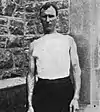
Thomas Hicks

King Ibn Saud
- January 3 – Alexandros Diomidis, Prime Minister of Greece (d. 1950)
- January 5 – J. Stuart Blackton, American film producer (d. 1941)
- January 6 – Leslie Green, British architect (d. 1908)
- January 7 – Thomas Hicks, American runner (d. 1952)
- January 9 – Gertrude Vanderbilt Whitney, American sculptor, socialite (d. 1942)
- January 11 – Reinhold Glière, Russian composer (d. 1956)
- January 14
- Felix Hamrin, 22nd Prime Minister of Sweden (d. 1937)
- Albert Schweitzer, Alsatian philosopher and musician, recipient of the Nobel Peace Prize (d. 1965)
- January 15
- Thomas Burke, American sprinter (d. 1929)
- King Ibn Saud of Saudi Arabia (d. 1953)
- January 22 – D. W. Griffith, American film director, (The Birth of a Nation) (d. 1948)
- February 1 – Eddie Polo, Austrian-American actor (d. 1961)
- February 2 – Fritz Kreisler, Austrian violinist (d. 1962)
- February 4 – Ludwig Prandtl, German physicist (d. 1953)
- February 7 – Erkki Melartin, Finnish composer (d. 1937)
- February 8 – Valentine O'Hara, Irish author, authority on Russia and the Baltic states (d. 1941)
- February 21 – Jeanne Calment, French supercentenarian, world's longest lived person (d. 1997)
- February 26 – Emma Dunn, British-born stage, screen actress (d. 1966)
March–April
- March 4 – Mihály Károlyi, Prime Minister and President of Hungary (d. 1955)
- March 7 – Maurice Ravel, French composer (d. 1937)
- March 8 – Kenkichi Ueda, Japanese general (d. 1962)
- March 9 – Juan de Dios Martínez, 23rd President of Ecuador (d. 1955)
- March 19 – Zhang Zuolin, Chinese bandit, soldier, and warlord (d. 1928)
- March 26 – Syngman Rhee, President of South Korea (d. 1965)
- March 28 – Helen Westley, American stage, film actress (d. 1942)
- April 1 – Edgar Wallace, English author (d. 1932)
- April 2 – Walter Chrysler, American automobile pioneer (d. 1940)
- April 4
- April 5 – Mistinguett, French singer (d. 1956)
- April 8 – King Albert I of Belgium (d. 1934)
- April 15 – James J. Jeffries, American boxer (d. 1953)
- April 18 – Abd-ru-shin, German author (d. 1941)
May–June
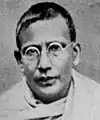
Krishna Chandra Bhattacharya
- May 2 – Owen Roberts, Associate Justice of the Supreme Court of the United States (d. 1955)
- May 6 – William D. Leahy, American admiral (d. 1959)
- May 11 – Harriet Quimby, American pilot (d. 1912)
- May 12
- May 23 – Alfred P. Sloan, American automobile industrialist (d. 1966)
- June 4 – Albert E. Smith, English stage magician, film director and producer (d. 1958)
- June 6
- J. Farrell MacDonald, American character actor, film director (d. 1952)
- Thomas Mann, German novelist, Nobel Prize laureate (d. 1955)
- June 9 – Henry Hallett Dale, English pharmacologist and physiologist, Nobel Prize laureate (d. 1968)
- June 12 – Sam De Grasse, Canadian actor (d. 1953)
- June 15 – Herman Smith-Johannsen, Norwegian supercentenarian (d. 1987)
- June 24 – Diedrich Westermann, German linguist (d. 1956)
- June 28 – Henri Lebesgue, French mathematician (d. 1941)
July–August
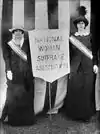
Katharine McCormick
- July 3
- July 10
- Dezső Pattantyús-Ábrahám, Hungarian politician (d. 1973)
- Mary McLeod Bethune, American educator (d. 1955)
- July 25 – Jim Corbett, Anglo-Indian hunter, conservationist and author (d. 1955)
- July 26
- August 8 – Arthur Bernardes, 12th President of Brazil (d. 1955)
- August 10 – Florrie Forde, Australian-born music hall singer (d. 1940)
- August 15 – Samuel Coleridge-Taylor, English composer (d. 1912)
- August 16 – Juho Sunila, Prime Minister of Finland (d. 1936)
- August 21 – Winnifred Eaton, Canadian author (d. 1954)
- August 26 – John Buchan, Scottish-Canadian historian and politician, 15th Governor General of Canada (d. 1940)
- August 27 – Katharine McCormick, American suffragist (d. 1967)
- August 29 – Leonardo De Lorenzo, Italian flautist (d. 1962)
September–October
- September 1 – Edgar Rice Burroughs, American author (d. 1950)
- September 3 – Ferdinand Porsche, Austrian automotive engineer (d. 1951)
- September 16 – James Cash Penney, American businessman, founder of J. C. Penney (d. 1971)
- September 18 – Tomás Burgos, Chilean philanthropist (d. 1945)
- September 22 – Mikalojus Konstantinas Čiurlionis, Lithuanian composer (d. 1911)
- October – George Ranetti, Romanian poet, publicist (d. 1928)
- October 1 – Eugeen Van Mieghem, Belgian painter (d. 1930)
- October 12 – Aleister Crowley, British occultist (d. 1947)
- October 23 – Gilbert N. Lewis, American chemist (d. 1946)
- October 31 – Vallabhbhai Patel, Indian political leader (Iron Man of India) (d. 1950)
November–December
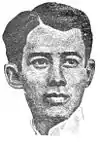
Gregorio del Pilar

Theodor Innitzer
- November 8 – Qiu Jin, Chinese revolutionary, writer and feminist (d. 1907)
- November 14 – Gregorio del Pilar, Filipino general (d. 1899)
- November 30 – Otto Strandman, 1st Prime Minister of Estonia (d. 1941)
- December 4 – Rainer Maria Rilke, Austrian poet (d. 1926)
- December 5 – Arthur Currie, Canadian general (d. 1933)
- December 6 – Evelyn Underhill, British writer (d. 1941)
- December 11 – Yehuda Leib Maimon, Bassarabian-born Israeli rabbi, government minister (d. 1962)
- December 12 – Gerd von Rundstedt, German field marshal (d. 1953)
- December 15 – Emilio Jacinto, Filipino poet, revolutionary (d. 1899)
- December 19 – Mileva Marić, Albert Einstein's first wife (d. 1948)
- December 24 – Otto Ender, 8th Chancellor of Austria (d. 1960)
- December 25 – Theodor Innitzer, Austrian Catholic cardinal (d. 1955)
Deaths
January–June
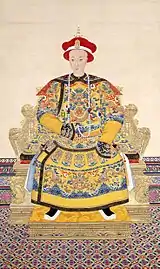
Tongzhi Emperor
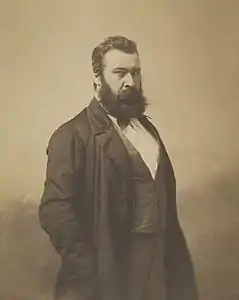
Jean-François Millet
- January 12 – Tongzhi Emperor, 8th emperor of Qing dynasty (b. 1856)
- January 20 – Jean-François Millet, French painter (b. 1814)
- January 23 – Charles Kingsley, English writer (b. 1819)
- February 5 – Birgitte Andersen, Danish actress and ballet dancer (b.1791)
- February 7 - Edmund Spangler, American stagehand at Ford's Theatre (b. 1825)
- February 22
- Jean-Baptiste-Camille Corot, French painter (b. 1796)
- Sir Charles Lyell, Scottish geologist (b. 1797)[13]
- March 1 – Tristan Corbière, French poet (b. 1845)
- April 4 – Karl Mauch, German explorer (b. 1837)
- April 17 – Marija Milutinović Punktatorka, Serbian lawyer (b. 1810)
- April 25 – the 12th Dalai Lama (b. 1857)
- May 17 – John C. Breckinridge, 14th Vice President of the United States, Confederate States Secretary of War (b. 1821)
- May 20 – Amalia of Oldenburg, Greek queen (b. 1818)
- May 31 – Eliphas Lévi, French occult author, magician (b. 1810)
- June 2 – Józef Kremer, Polish philosopher (b. 1806)
- June 3 – Georges Bizet, French composer (b. 1838)
- June 4 – Eduard Mörike, German poet (b. 1804)
- June 25 – Antoine-Louis Barye, French sculptor (b. 1796)
- June 29 – Ferdinand I of Austria, Emperor of Austria (b. 1793)
July–December
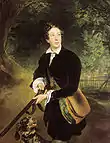
Aleksey Konstantinovich Tolstoy
- July 8 – Francis Preston Blair Jr., American politician, Civil War officer (b. 1821)
- July 29 – Paschal Beverly Randolph, American occultist (b. 1825)
- July 30 – George Pickett, American Confederate general (b. 1825)
- July 31 – Andrew Johnson, 17th President of the United States (b. 1808)
- August 4 – Hans Christian Andersen, Danish writer (b. 1805)
- August 6 – Gabriel García Moreno, President of Ecuador (b. 1821)
- August 10 – Karl Andree, German geographer (b. 1808)
- August 11 – William Alexander Graham, United States Senator from North Carolina, (1840-1843), Confederate States Senator (1864-1865) (b. 1804)
- August 12 – János Kardos, Hungarian Slovenes evangelic priest, teacher and writer (b. 1801)
- August 16 – Prince Karl Theodor of Bavaria, Bavarian field marshal (b. 1795)
- August 17 – Wilhelm Bleek, German linguist (b. 1827)
- August 25 – Charles Auguste Frossard, French general (b. 1807)
- August 27 – William Chapman Ralston, American banker and financier (b. 1826)
- September 12 – Chauncey Wright, American philosopher and mathematician (b. 1830)
- September 22 – Charles Bianconi, Italian-Irish entrepreneur (b. 1786)
- October 10 – Aleksey Konstantinovich Tolstoy, Russian writer (b. 1817)
- October 12 – Jean-Baptiste Carpeaux, French sculptor, painter (b. 1827)
- October 15 – Chief Lone Horn, Native American Chief (b. 1790)
- October 19 – Sir Charles Cowper, Australian politician, Premier of New South Wales (b. 1807)
- October 24 – Jacques Paul Migne, French priest, theologian, and publisher (b. 1800)
- November 14 – Werner Munzinger, Swiss adventurer (b. 1832)
- November 21 – Orris S. Ferry, American Civil War general and politician (b. 1823)
- November 22 – Henry Wilson, 18th Vice President of the United States (b. 1812)
- November 24 – William Backhouse Astor, Sr., American businessman (b. 1792)
- November 27 – Richard Christopher Carrington, English astronomer (b. 1826)
- December 13 – Théonie Rivière Mignot, American restauranter and businesswoman (b. 1819)
- December 25 – Young Tom Morris, Scottish golfer (b. 1851)
References
- Lockwood, Jeffrey A. (2004). Locust: the Devastating Rise and Mysterious Disappearance of the Insect that Shaped the American Frontier. New York: Basic Books. ISBN 0738208949.
- Smith, Ronald A. (1988). Sports and Freedom: The Rise of Big-Time College Athletics. New York: Oxford University Press.
- "The Origins of Hibernian - Part 1". Hibernian FC: The Official Website. August 11, 2009. Archived from the original on March 4, 2014. Retrieved February 27, 2014.
- "The Early Years 1875-1904" (PDF). When Football Was Football. Haynes. Retrieved January 3, 2015.
- "1875–1884: The early years". Blackburn Rovers F.C. July 2, 2007. Archived from the original on March 9, 2009. Retrieved July 1, 2011.
- "The Purpose of the Foundation of Doshisha University | About Doshisha | Doshisha University". www.doshisha.ac.jp. Retrieved January 19, 2021.
- This inspires Gerard Manley Hopkins' poem The Wreck of the Deutschland, not published until 1918.
- Gordon, Richard (1994). The Alarming History of Medicine. New York: St. Martin's Press. p. 12. ISBN 0-312-10411-1.
- History of Medicine Days Archived June 15, 2004, at the Wayback Machine, p. 132.
- ja:田中久重/田中製造所の設立と晩年 (Japanese language edition) Retribute date 4 December 2018.
- C. N. Pyrgidis. Railway Transportation Systems: Design, Construction and Operation. CRC Press, 2016. P. 156
- Ye. N. Petrova. St. Petersburg in Focus: Photographers of the Turn of the Century; in Celebration of the Tercentenary of St. Petersburg. Palace Ed., 2003. P. 12
- "Sir Charles Lyell (1797-1875)". National Records of Scotland. May 31, 2013. Retrieved October 28, 2021.
Further reading and year books
- 1875 Annual Cyclopedia (1876) highly detailed coverage of "Political, Military, and Ecclesiastical Affairs; Public Documents; Biography, Statistics, Commerce, Finance, Literature, Science, Agriculture, and Mechanical Industry" for year 1875; massive compilation of facts and primary documents; worldwide coverage; 801pp
kidawapan city lanao sakong sanakomriytahertgsa boss 7 bkong sukarap 1875 sapinsakong salong makong ang sapoikimrsa
This article is issued from Wikipedia. The text is licensed under Creative Commons - Attribution - Sharealike. Additional terms may apply for the media files.
